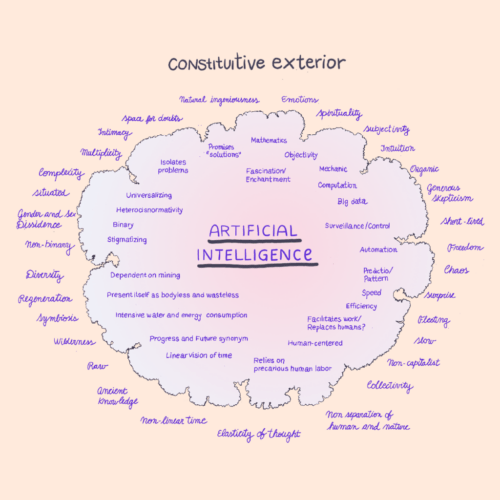Coding launches book at the 4th project cycle of the Latin American chapter of the Feminist AI Research Network f<A+i>r
#artificial intelligence #speculative futuresIn “The compost engineers and sus saberes lentos: a manifest for regenerative technologies“, Joana Varon and Lucia Egaña propose regenerative systems of compost engineers, a prototype of feminist technology.
Launched on August 6, 2024 during the closing of the 4th project cycle of the Latin American chapter of the Feminist AI Research Network f<A+i>r, the book “The compost engineers and sus saberes lentos: a manifest for regenerative technologies” questions whether we can change technological imaginaries to regenerative systems instead of extractivist technologies focused on war, anxiety and domination.
Studying colonial science fiction narratives and the history of technological development, the authors start from the premise that “AI” is a loaded terminology, generating very limited imaginaries of possible futures: fast and metallic, colonial and patriarchal futures from Silicon Valley and Hollywood. What valuable feminist concepts are left behind when we use the term “AI”? Starting from the idea of AI’s constitutive exterior, the authors developed the diagram below to make explicit what these concepts are:

After a brief immersion in Biology and Ecology studies, the researchers propose imagining a prototype of decolonial feminist technology that aims to regenerate, recognize and reconnect humans with the organic decision-making systems that operate in nature: the regenerative systems of compost engineers. From radical imagination and speculative narratives, and from everything that is left out when we use the term AI, we want to propose concepts capable of inspiring the development of situated technologies, non-universalizing, non-human-centered and connected to other rhythms, slower than the rhythm of capitalism. We propose that ingenuity focused on regeneration can be prioritized as intelligent technology. We propose a reconnection with life technologies, technologies of well-being.
The alternative epistemologies and practices for technological development proposed by Joana and Lucía recognize our current context of climate emergency and realign with ancestral knowledge, which was depreciated by colonial violences that has crossed time and is still present in the development of digital technologies.
Part of this journey was also inspired by three interviews conducted from June to August 2023 with Chilean biotechnologist Daniela Torres, director of the Chile office of the Fungi Foundation; Cinthia Mendonça, director of Silo, a rural station in Brazil dedicated to seeking questions and answers to the challenging issues of our time, offering experiences for knowledge exchange and human development, working with art, science, technology and agroecology; and Denise Alves-Rodrigues, queer technologist, creator, artist and educator, inspired by repositioning other technologies at the same status as digital technologies.
From the territories we inhabit, it is impossible not to link technologies with their globally distributed and geopolitically interconnected effects. In this sense, it is necessary to consider how feminist technology can serve the restoration, reparation and preservation of territories and their knowledge.
The study in English is available here.
About the Authors
Joana Varon is Brazilian, with Colombian ancestry, founder-director and creative chaos catalyst at Coding Rights, a feminist organization that contributes to debates about the development, implementation and regulation of technologies from a collective, transfeminist, decolonial and anti-racist human rights perspective, which through creativity and hacker knowledge seeks to stimulate imaginaries and actions that challenge power inequalities. Former fellow at the Berkman Klein Center for Internet and Society at Harvard University. Former Technology and Human Rights Fellow at the Carr Center for Human Rights Policy at Harvard Kennedy School and former Mozilla fellow as ex-media fellow. Feminist and human rights defender, she has over 15 years of experience influencing debates in international technology governance arenas, from diplomatic to technical forums, such as the Internet Engineering Task Force (IETF), where she was part of the group of researchers who initiated the working group on Human Rights Considerations for Standards and Protocols. She is also co-creator of various projects that operate at the intersection of activism, arts and technologies, such as transfeministech.org, cartografiasdainternet.org, museamami.org, Chupadados.com, #safersisters, Safer Nudes, protests.org, Net of Rights and freenetfilm.org.
Lucía Egaña Rojas studied Art, Aesthetics and Creative Documentary and has a PhD in Audiovisual Communication. As an artist, she works on projects that problematize the construction of social imaginaries and sources of hegemonic knowledge. Her projects are formalized through artistic production, writing, research, pedagogy and self-institutional practices. Her artistic work cannot be circumscribed to a specific medium and can be consulted at http://luciaegana.net. In the educational field, she moves between academic spaces and informal pedagogies. She was a professor and part of the academic direction of the Independent Studies Program (PEI) at the Museum of Contemporary Art of Barcelona (MACBA), associate professor at the Faculty of Fine Arts of the University of Barcelona, guest lecturer in the Gender Master’s at the University of Chile and in the MUECA master’s (UMH). Within transfeminist activism, she was an organizer of the post-pornography festival Muestra Marrana and, in 2011, made the documentary “Mi sexualidad es una creación artística” (My sexuality is an artistic creation), in addition to currently co-directing the Instituto de Estudios del Porno (Institute of Porn Studies). Her writing explores different formats, from fiction to essay, through poetic prose, manifesto and academic text. She has published “Enciclopedia del amor en los tiempos del porno” (Cuarto propio, 2014; Trío editorial, 2020), “Atrincheradas en la carne. Lecturas en torno a las prácticas postpornográficas” (Bellaterra, 2018), “Acá soy la que se fue” (tictac ediciones, 2019), “Una cartografía extraña” (Metales Pesados, 2021), among others. Her artistic work is often expressed collectively, where she participates in Musea M.A.M.I, the Centro de Estudios de la Naturaleza Extractiva (CENEx) and Pluriversidad Nómada, a project promoted together with Quimera Rosa. Her main interests involve feminisms, methodologies, technology, north-south power relations, colonial and migratory processes, extractivism and error.
